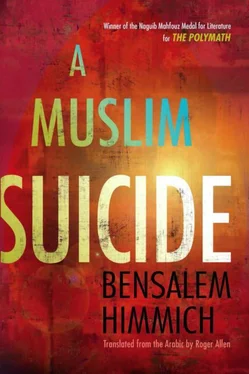Once settled in Sabta, Ibn Sabin takes up residence on the mountain in a "zawiya" (a term that I have retained in the translation because no single word in English can cover its multiple functions: part shrine and mosque, part hostel, part retreat-house, and, in this case, provider of shelter for the indigent and insane). His reputation as a teacher has preceded him, and once again he becomes something of a magnet to those members of the local community of Muslims, and particularly young Muslims, who are in search of an alternative to prevailing orthodoxies. The continuing crisis in Spain even leads him to engage in a fascinating correspondence with King Frederic of Sicily, who is shown to have a very open mind about Muslim-Christian relations and even seems inclined to support the Muslims in the conflict against his fellow Christians in Spain. Ibn Sabin also forms a close relationship with Ibn Khalas, the governor of Sabta, who is duly impressed by the Sufi philosopher-theologian's wide learning, and in matters of both religion and medicine. However, it is another close relationship in Sabta that is to have a lasting impact upon Ibn Sab'in's life. A very beautiful and wealthy woman, Fayha', invites him to visit her opulent residence and makes it clear that she is in love with him as both a person and a spiritual guide. The two are married, and Ibn Sabin moves from the mountain zawiya into his wife's home, to which a private closet has been added for his own use. They live a very contented life together, and Ibn Sabin now hopes that he has found a haven of stability where he may continue to study, teach, worship, and contemplate. However, the admiration of Ibn Khalas is not sufficient to protect him from the increasingly pointed attacks from orthodox cronies dispatched by the Almohad authorities in Marrakesh, and eventually Ibn Sabin is firmly instructed by the governor to move on. In this case, that implies undertaking the pilgrimage to Mecca and remaining out of the region until the political situation stabilizes (presumably as a result of the downfall of the Almohad dynasty). With a heavy heart Ibn Sabin says farewell to his beloved wife, sending her to stay with her relatives in Tangier and not realizing at the time that he will never see her again.
The travel toward Mecca takes Ibn Sabin first to the city of Bijaya (known in French as Bougie), and it is there that one of the most important relationships in his life is to develop. He meets the renowned Sufi poet Abu al-Hasan al-Shushtari (d. 1269 CE), a virtuoso singer, poet, and musician in addition to his role as a devout ascetic. The two men form a lifelong bond. The extract from one of Al-Shushtari's poems devoted to Ibn Sabin that Himmich cites at the conclusion of this novel is evidence enough of the total affinity that connects the two prominent Sufis, with Al-Shushtari regarding Ibn Sabin as his spiritual mentor:

Since Ibn Sabin is forbidden to return to the Maghrib (or, at least, without placing his life in great danger), it is Al-Shushtari whose journeyings back and forth across North Africa keep his friend in touch with his wife, colleagues, and students in Sabta, Tangier, and Spain.
The continuing journey toward the goal of the Hijaz in Arabia and the Ka`ba shrine in Mecca now takes Ibn Sabin first to Tunis, from which he is ordered to depart in short order, and to Cairo, where, after staying in a local Sufi hostel and gathering-yet again-a group of students around him, he is gruffly interrogated by the presiding judges of the city and told to leave. However, placing his own life in danger, he stays on in order to treat the terribly wounded Al-Shushtari, who has joined the Muslim forces fighting the Crusaders at the Battle of Dimyat (English Damietta), part of what is generally known in Europe as the "Seventh Crusade," led by King Louis IX of France (1248-54 CE). However, once Al-Shushtari is sufficiently recovered, Ibn Sabin joins a caravan heading south toward the port of 'Aydab, where he will find a ship to transport him across the Red Sea to Jedda and then Mecca.
It is in Islam's holiest site that Ibn Sabin is to spend the remainder of his life, although, needless to say, he continually aspires to return to his beloved Maghrib. His hopes of any return to his native Al-Andalus seem to have long since been crushed. The era-indeed the thirteenth century CE in general-is fraught with conflict: the ongoing reconquista in Spain, the equally ongoing series of Crusades, and, most recently, the Mongol armies' steady advance across Asia. In 1258, the Mongols sack Baghdad amid scenes of barbaric cruelty, in the process bringing to an end the 'Abbasi caliphate, which, since the mid-tenth century, had served the community of Muslims as a kind of spiritual figurehead but one with no real political authority. As the Mongols continue their westward march, it is the army of Egypt, led by the famous hero of Arabic lore Al-Zahir Baybars, that is to confront the Mongols and eventually defeat them at the Battle of 'Ayn Jalut (Goliath's Spring) in 1260. Ibn Sabin, as we have noted above, has already been subjected to a kind of "inquisition" at the hands of the Islamic orthodox establishment in Cairo, so it is not surprising that the victorious Baybars, now ruler of Egypt, comes to Mecca in the wake of his triumph with the twin purposes of performing the pilgrimage and putting a definitive end to Ibn Sab'in's "heretical" preaching and writing.
Ibn Sab'in's prolonged stay in Mecca has been much facilitated by his friend Al-Shushtari, who has arranged for him to reside in a local hostel for Maghribi residents and visitors. From there, he is able to perform the major and minor pilgrimages on a regular basis, to explore the city and its environs, to observe the habits of pilgrims from different parts of the Islamic world, and to teach students in a variety of locales within the city and in its environs. Once again, his reputation as a scholar, physician, and radical thinker has preceded him, and he earns the respect of the governor of Mecca, who accepts his medical and spiritual advice while offering him as much protection as he can. It is the governor with whom Ibn Sabin discusses the impending threat posed by the Mongol invasion and the vexed question of allegiance, now that the `Abbasi caliphate in Baghdad has collapsed. In Egypt Sultan Baybars has accepted the validity of the claims of a young 'Abbasi "survivor" of the Mongol massacre in Baghdad, but Ibn Sabin persuades the governor of Mecca (who is thus leader of the sharifs-descendants of the Prophet Muhammad himself) to declare his allegiance to Al-Mustansir, the Hafsid ruler in Tunis. With the advent to Mecca of Baybars himself, both the governor and Ibn Sabin find themselves on the wrong side.
Yet another pattern from Ibn Sab'in's life journey repeats itself in Mecca, in that a beautiful Egyptian widow, Umama, visits him in his residence and declares her admiration. He is clearly much attracted to his devoted and lovely new disciple, but the image of his wife, Fayha', continually appears before his eyes. However, when Fayha' dies of a fever during her long journey to join her husband in Mecca, he finally acknowledges the suggestions of his companions that he is really obliged to marry the Egyptian widow who has remained loyal to him for such a long time.
Among the communities with whom Ibn Sabin has become acquainted during his prolonged stay in Mecca is a group of Maghribi Amazighen who have established for themselves a complete encampment outside the city where they can practice their agricultural skills. It is among them that he and his new wife spend their honeymoon, and it is in their secret subterranean storeroom that they spend the entire pilgrimage month while Baybar's forces scour the city and countryside searching for him. Once Baybars has finally left the city after failing to achieve his goal, Ibn Sabin and his wife emerge from their hiding place to much rejoicing. And yet the situation is still not safe. He decides to send his wife to Egypt for her own safety, and, upon hearing that his sessions are being infiltrated by spies, moves his quarters to live the lonely and secluded life of a bachelor once again. He becomes severely ill and endeavors to treat himself, but without success. Bad news piles upon bad news: his son has been imprisoned by Baybars in Cairo; and one of his Andalusian students who has traveled all the way to Mecca to see him has been turned away. As the fever associated with the disease worsens, Ibn Sabin starts seeing nightmarish visions of Baybars, threatening him with death. In a massively controversial and defiant gesture, he staggers his way to the Ka`ba shrine. In a virtual coma, he lies against a wall and, at least in this novel, feels his wrists being slit…
Читать дальше













